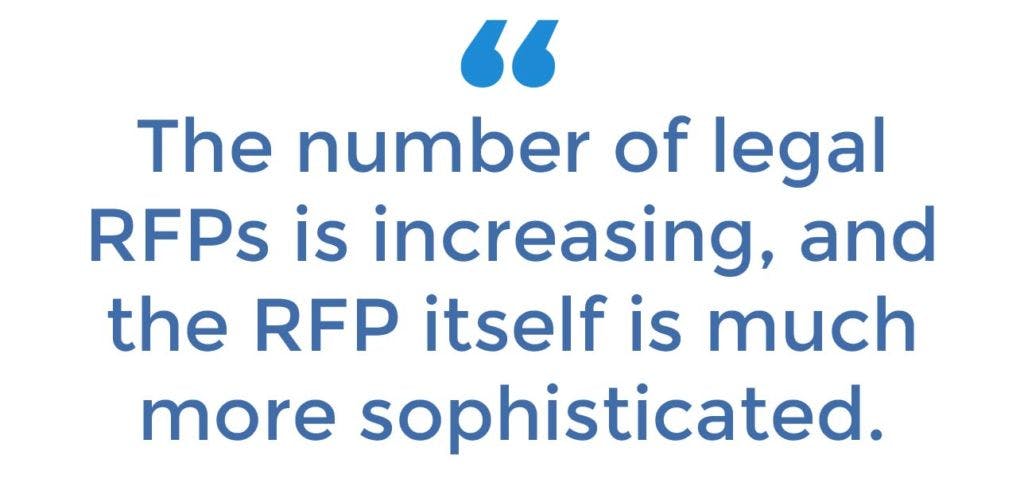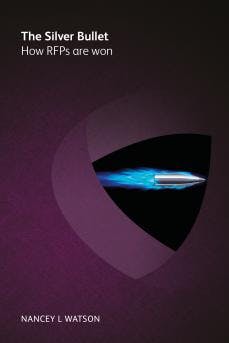When it comes to the legal RFP process,Nancey Watson does it all. She partners with both legal and corporate legal clients and is an expert at getting results. As a veteran consultant for buyers and sellers in the legal industry, she has helped develop corporate legal RFPs and helped professional services firms win more than $3 billion in competitive bids.

Recently, I had the opportunity to talk with Nancey and ask all of my questions about issuing and responding to law firm RFPs. With the advantage of her experience on both sides of the legal procurement process, our interview covered a lot of topics. From her background and experience, to advice for both in-house legal procurement and law firm proposal teams, you won't want to miss her insights.
Explore the full interview below to learn from her expertise in legal RFPs.
Expert legal RFP advice
RFP360 — How did you get into legal RFPs as a profession?
Nancey — I’ve written proposals for professional services firms for over 25 years. I always held a business development role and therefore, I was always involved in proposals.
I got started working in the legal industry in 2008 when I was hired to write proposals by a firm that later merged with Dentons. Then, as my success rate was very high, I decided to start my own proposal consulting firm.
I love proposal strategy and writing proposals. I find it very exciting when working with a proposal team and watching the energy build as we discuss various strategies. And of course, I love winning!
In addition, I work with in-house legal departments and legal procurement professionals to develop legal RFPs. I’ve done that for about five years, as this is a relatively new area of expertise in the legal industry.
RFP360 – So, after over 25 years working on responding to legal RFPs, you’ve probably seen some things. Can you share your favorite anecdote or success story?
Nancey — Oh, I have so many stories that I could tell you. I would say that my favorite examples revolve around working on bids that we did not have a chance of winning. By that, I mean that we only had the opportunity to propose because we were the incumbent. However, the firm had serious challenges with the client relationship, and we believed we were not going to win.
This is where strategy and courage are needed. I had to suggest a new team. In addition, I recommended that the law firm admit that things did not go well. Certainly, it was unconventional so, I have to give credit to the partners that agreed with that strategy.
However, the actual solution to the challenge was just as important, so a lot of work had to be done to reestablish credibility with the client. I have helped pull several firms out of the fire by providing solutions that work, even though they are difficult at times. There is nothing more rewarding than to hear from the client that, originally, the firm was not even going to be considered, but the solution was so compelling that they were happy to continue working with the law firm.
How to adapt to the changing legal RFP landscape
RFP360 — In your time working in the legal industry, what has changed about the legal RFP process?
Nancey — Over the past five years I have noticed that the majority of RFPs are coming from legal procurement. Although the GC signs them, legal operations or procurement has often worked on the RFP in the background.
When I noticed that the majority of corporate legal RFPs were coming from legal procurement, I said to myself, ‘Who are these guys?’ So, I decided to research them and found out that Fortune 500 companies were hiring legal procurement professionals.
At the time, the job descriptions were all over the map but one of their primary functions was, and still is, creating and issuing legal RFPs. As I work with law firms on proposals and facilitate proposal strategy workshops, I know what the buyers of legal services need and expect in a proposal. The number of legal RFPs is increasing, and the RFP itself is much more sophisticated. Accordingly, this is reflective of the expertise of the legal procurement professionals.

RFP360 — When you work with a law firm on an RFP, what is their biggest process challenge?
Nancey — I would say that many firms give the task of responding to RFPs to newer entrants into the legal industry. I look at RFPs as low hanging fruit, so I find it puzzling that such a great revenue generating opportunity — with fees going straight to the bottom line — is given to inexperienced people.
I also notice that many firms do not have the right RFP technology to manage best practices. They don’t have standard proposal content that is readily available. Instead, they either go the last proposal they wrote or are constantly reinventing the wheel. Of course, the content needs to be customized, but it is a good place to start when responding to repetitive-type questions. For example, how a law firm handles a conflict of interest.
Learn more about law firm RFP best practices in this blog post – The law firm RFP: Top trends, tips and tools
RFP360 — What advice would you give a law firm when they’re making a go/no-go decision?
Nancey — I strongly believe law firms should use a good go/no-go process. Which is why I spend some time on this in my proposal strategy workshop. However, some firms say that they don’t need that module because they bid on every opportunity. Hearing this surprises me. I’m not saying that if you do not have an existing relationship with the company, that you shouldn’t bid. In fact, many times you should. I’m just saying that part of the go/no-go process should include doing your homework on the prospective client.
Spotting and making the most of predetermined RFPs
Before the go/no-go discussion, it’s important to understand why the RFP is being issued. To help law firms evaluate, I wrote an article for Thomson Reuters’ Legal Executive Institute titled How Can You Tell If the RFP Is Predetermined? We all know that it is usually corporate policy to get three quotes on everything. Knowing this, I can spot a predetermined legal RFP quite quickly. There is certain jargon that is not industry standard terminology — that is a dead giveaway. Similarly, when the deadlines are so short that it is impossible to respond with convincing content, it’s unlikely to be a fair fight for the business.
I have told partners that I believe the RFP is predetermined but they often want to proceed anyway. That is fair – you never really know, and you may be able to upset the apple cart. I let the partners know though, that they need to put in the very best proposal they can, so that if they don’t win, they will definitely come in second. Then, when the law firm conducts the debrief, they need to impress the client and use this opportunity to create a great impression and start building a relationship. This has happened on more than one occasion. The GC tells the partners that if the selected firm does not do a good job, they will be in touch. In other cases, some teams have been given matters not listed in the original RFP.
Legal RFP technology
RFP360 — You’re a big advocate for technology, what are the benefits of incorporating technology into the legal proposal response process?
Nancey — Yes, I am a big proponent for technology for law firms. I have implemented proposal technology and used it at many firms. And, as a consultant it is great to have this resource available when working with a new client when I have to jump in and get a proposal out the door quickly.
On the law firm side, it is a great opportunity to get pre-approved, best practices proposal content in one place. A central proposal content repository saves time and frustration for lawyers who only need to supply an answer once. Technology allows the proposal team to spend more time focusing on customizing the content and strategy.
RFP360 — If you had to give one piece of advice to your clients when they’re getting ready to respond to a legal RFP, what would it be?
Nancey — That is a tough one because I believe that there are several strategic milestones that go towards winning a bid. If I had to choose one, I would say that it would be how you differentiate your team and the firm. GCs are hiring the people on the team not the firm. You get in the door because of your firm’s reputation, but it is the team that wins the bid.

While this is true, law firms need to know how they are different from their competitors. They must articulate it in the proposal and link it back to the team’s capabilities and how they will use the differentiators in providing legal services.
RFP360 — That’s great advice. So, can you tell me more about how you partner with law firms and corporate legal teams?
Nancey — I consult with corporate legal teams about the RFPs they want to issue, and I work with law firms to respond to the legal RFPs they’ve received.
On the law firm side, I wrote the book The Silver Bullet: How RFPs Are Won, published by Ark Group. I call the book a "handbook," and my workshop "hands on." The workshop is called Proposal Management Strategies. In the course we analyze an RFP, work through the proposal and do exercises to reinforce the learnings so that they can be applied right away. I also coach partners and writing teams when I am called upon to write proposals or assist with a proposal presentation.

And, on the in-house side, my goal is to help in-house legal departments develop RFPs. In my career, I have seen the good, the bad and the ugly when it comes to best practices for legal RFPs. So, I understand the kind of questions procurement and legal operations should be asking in RFPs. Therefore, I built a database of hundreds of questions by industry and practice area. These are the right questions to ask in order to get the precise information procurement needs when asking about qualifications, experience and fees.
Advice for corporate legal teams issuing legal RFPs
RFP360 — So, let’s turn the tables. What’s the biggest challenge facing legal RFP issuers?
Nancey — I would say that because pricing is such a big factor for in-house legal departments that asking the right questions about fees is an area of weakness in a lot of legal RFPs that I have responded to. The questions are vague and there is often not a place where the law firm can explain the math.
Similarly, in-house counsel and procurement are often unable to track their legal spend on matters from RFPs and once the project goes live.
Another area where many in-house departments need help, is in evaluating complex proposals. More than once I’ve heard from procurement professionals that they regretted sending out an RFP because it took so long to evaluate all the proposals. For example, I am aware of one company that took 18 months to make a decision because of all the work involved in the selection process.
RFP360 — In your experience, are corporate legal teams issuing more RFPs now than in the past? If so, why do you think that is?
Nancey — Yes, they are definitely issuing more RFPs. More companies are establishing panel firms. And with new issues coming up like cybersecurity, more sophisticated and specialized advice is being sought from external law firms.
RFP360 — If you had to offer one piece of advice for corporate legal RFP issuers, what would it be?
Nancey — I would say ask the right questions for the information you really want. Don’t be vague.
RFP360 — Thank you so much for your time and advice about legal RFP best practices. Where can people learn more about your services and find the events you’ll be speaking next?
Nancey — It’s been a pleasure. To learn more or connect with me, people can visit my website: nlwatsonconsulting.com or follow me on LinkedIn or Twitter. I often post articles about new trends, as well as information about upcoming webinars and events.
To discover more resources for the RFP process or to explore RFP technology, visit RFP360.com

